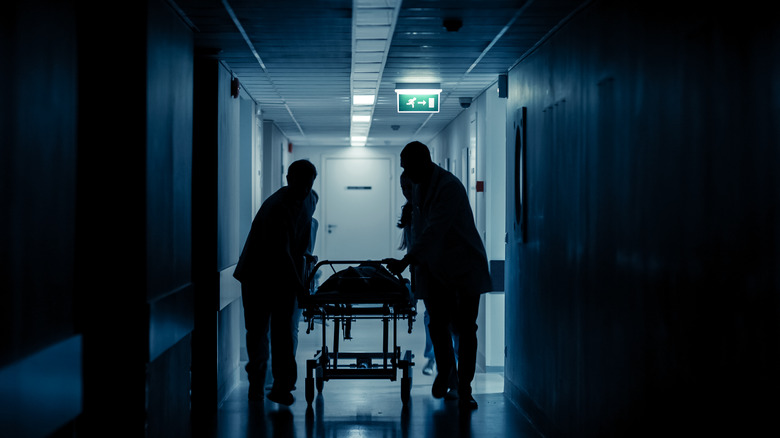Why Some Say July Is The Most Dangerous Month To Go To The Hospital
Nobody ever plans or wants to get rushed to the emergency room. In countries like the U.S., healthcare prices are so absurd that a single hospital visit can land someone in debt for years. But even placing exorbitant bills aside, many people associate hospitals with suffering, misery, pain, and death rather than health and recovery. But if you've got to go, or you get into an accident and need help, is it really the case that some months are better than others to pay a visit?
According to the "July Effect," the answer to that question is a resounding "yes." Common sense might lead you to think that people are more physically active in summer months like July and more prone to risky behavior, therefore hospitals are busier, patient care more strained, and human error more common. Or you might conclude the opposite: Winter months are more dangerous because of colds and seasonal flus, because where else but a hospital is great for packing together a whole bunch of sick, breathing, disease-transmitting people? Interestingly enough, Clipboard Health says hospitals are actually busiest around major holidays, as people tend to drink too much and do stupid things like throw fireworks in the toilet.
In reality, July is the most dangerous month to go to the hospital for a reason you probably wouldn't expect: doctors' schedules. As TIME says, the most experienced doctoral residents ship out in July, and the less experienced ones take their place.
New to the job
As TIME explains, doctors generally agree that July is the least safe time for patients to receive care. New M.D. graduates — straight out of medical school — file into hospitals in July to start their three-to-six-year on-the-job shadowing of elder doctors. To make room for this new class, the most experienced trainees head out to whatever assignment awaits. So if you waltz into a hospital in July, your life might be in the hands of a person who is providing care for the very first time. New doctors are getting accustomed to a dense network of interpersonal relationships between other new doctors, those passing down knowledge, technicians, assistants, and so forth.
The Guardian goes into further detail on that point, characterizing the introduction of new doctors to a hospital as marked by "terror, pride, hierarchy and failing IT." Numerous testimonials from doctors' first days describe exhaustion, confusion, not knowing what to do for patients in serious conditions, a lack of hospital support staff, veteran doctors on vacation, and more. These testimonials come from U.K. doctors who start their residencies in August on "Black Wednesday" — the first Wednesday of the month, not July. But it's reasonable to assume that the same experience extends to the first months of doctoral residency in the U.S. and elsewhere. In fact, The Healthy says that patients in July and August have a 41% greater chance of dying in surgery, for instance, than patients in April and May.
Bungled communication and misdiagnoses
The Annals of Internal Medicine illustrates the July Effect by discussing a specific instance of the care that an elderly woman received in the hands of newly graduated doctors, also referred to as interns. A perfect storm of blundered diagnoses, incorrect instrument usage (the doctor actually inserted the wrong tube into the woman's body), and forgotten radiographs resulted in a simple case of mild pancreatitis — inflammation of the pancreas — resulting in death. As the article explains, such a shameful, completely preventable occurrence creates a "vicious circle," where the risk faced by future patients increases because attending doctors failed to learn proper procedures at a critical moment.
The article describes a couple of additional factors that can exacerbate the dangers of heading to the hospital in July. "Anchoring bias," which many of us have experienced in many ways regardless of field, refers to the tendency to stick with an initial impression regardless of subsequent information. In the case of medical doctors, a doctor might reach a conclusion up front and dismiss alternatives rather than adjust or update an opinion. It makes sense that inexperienced doctors might be prone to such faulty decision-making. On top of this, patients often receive worse treatment on weekends than weekdays because of reduced services and the longer hours required of a small doctoral staff. Given all of the above, a very clear formula for worst-case hospital visits emerges: July, on the weekend, and requiring urgent care.


